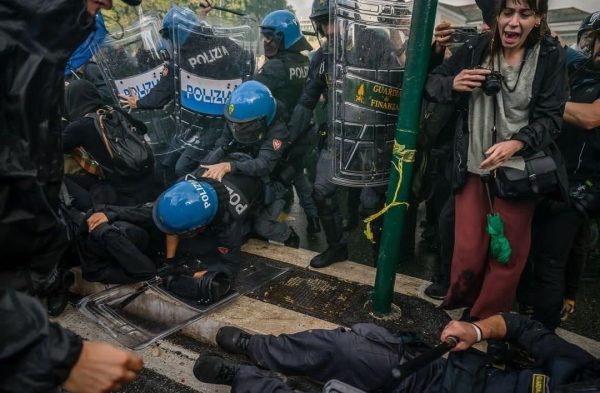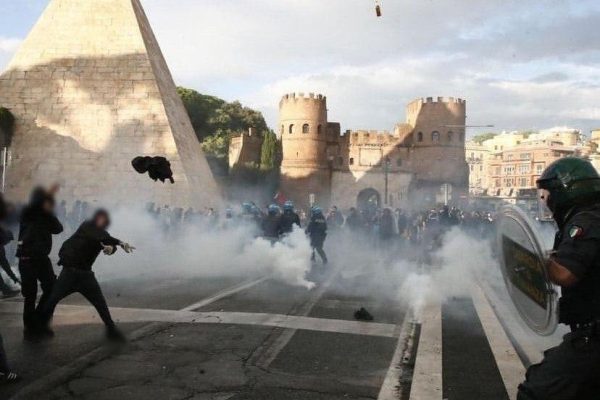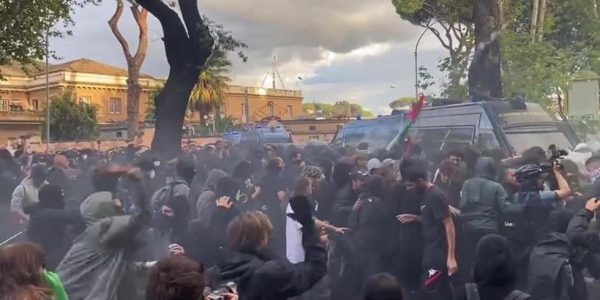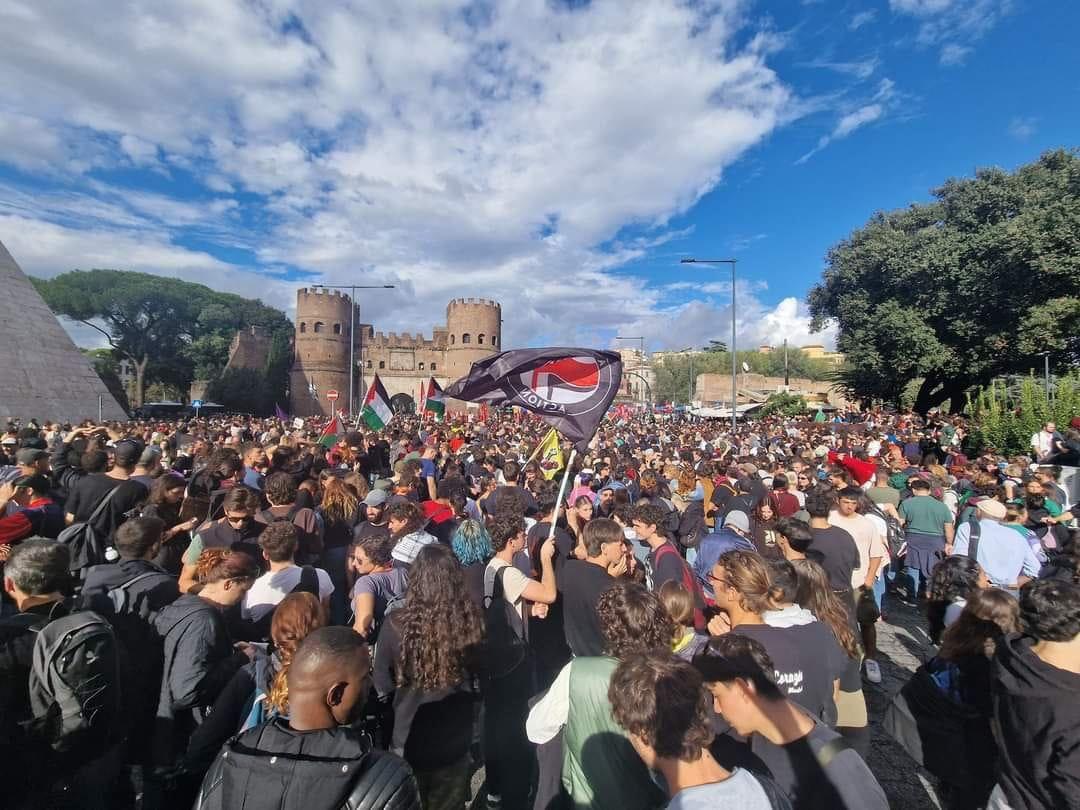In today’s world, fascism is often dismissed as a relic of history. But recent events in Italy suggest otherwise, and it’s a reminder that no nation is immune from authoritarianism creeping back into power. On Oct. 5, a pro-Palestine rally in Rome saw political repression under Italy’s far-right government, led by Prime Minister Giorgia Meloni. The protest, organized by the association “Young Palestinian” (Giovani Palestinesi), aimed to highlight opposition to Italian funding in the Israel-Palestine conflict and call for a ceasefire. However, Rome’s police banned the gathering, citing public safety concerns. Many Italians viewed this as a tactic to stifle dissent, especially as the crowd aimed to oppose the government’s policies.
Freedom of Assembly in Question
The 17th Amendment of the Italian Constitution states that citizens “[…] shall have the right to assemble peaceably and unarmed. No previous notice shall be required for meetings, including those held in places to which the public has free access. For meetings held in public places, previous notice must be given to the authorities, who may forbid them only for proven reasons of security or public safety.”
While authorities can intervene for “proven reasons of security,” the move to halt the protest has raised questions about freedom of speech under Italy’s current administration. Global awareness and advocacy are essential to counter any government’s threat to these fundamental rights. Threats to these rights, the ones that allow people to voice their opinions and express themselves, shouldn’t be taken lightly, so people all over the globe need to educate themselves about what’s happening in Italy—before it happens to them.
Europe’s Far Right Shift
Italy currently has the most far-right government since Mussolini. Yet, Italy is not alone in Europe’s growing trend toward the right right. Other countries, including Finland, Slovakia, Hungary, Croatia, and the Czech Republic, have similarly moved in this direction. This shift affects the European Parliament, which co-legislates EU laws and budgets and where right-wing coalitions currently hold a significant majority.
In the European Parliament, right coalitions or political groups currently hold 377 out of the 720 seats, while the leftist parties have 312 seats, and 32 members aren’t part of any coalition.
The European Parliament “acts as a co-legislator, sharing with the Council the power to adopt and amend legislative proposals and to decide on the EU budget. It also supervises the work of the Commission and other EU bodies and cooperates with national parliaments of EU countries to get their input,” according to Parliament.
In simpler terms, it’s the EU legislative body: it works with the Council to create new laws, sets budget and priorities for the EU, cooperates with the national parliaments and supervises every EU institution.
Giorgia Meloni: Italy’s first female prime minister
Since her election on Oct. 22, 2022, Giorgia Meloni’s tenure as Italy’s prime minister has marked a shift toward policies reminiscent of Mussolini’s regime. Mussolini, Italy’s dictator from 1922 to 1943, repressed free speech, outlawed opposition, and eventually allied with Hitler, implementing anti-Semitic laws and deporting Jewish Italians and political dissenters. Meloni’s political roots trace back to the Italian Social Movement (MSI), a far-right party founded by Mussolini’s supporters after World War II. By 15, Meloni had joined MSI, which later rebranded as the National Alliance. In 2012, Meloni co-founded the Brothers of Italy (Fratelli d’Italia), a party bearing MSI’s neo-fascist emblem, and one that still resonates with Mussolini’s ideology today.
Meloni’s far-right views have been evident throughout her career. In her autobiography I Am Giorgia: My Roots, My Ideas, and her speeches, she endorses traditionalist, nationalist ideals, often with undertones of xenophobia and anti-LGBTQ sentiment. At a rally for Spain’s neo-fascist party Vox, she declared, “Yes to the natural family, no to the LGBT lobby […] no to the bureaucrats of Brussels!” Her slogan, “Italy and Italians first,” implied a clear exclusion of immigrants, whom she portrays as outsiders and societal burdens. Under her government, Italy has seen a resurgence of policies affecting nearly every aspect of public life, from women’s healthcare to youth culture.
The recent “Safety Bill” (DDL Sicurezza) epitomizes this approach. Approved by the Chamber of Deputies on Sep. 18, the bill criminalizes various forms of protest, targeting actions commonly associated with student and climate activism, such as passive resistance, roadblocks, and demonstrations against public infrastructure projects. Non-EU citizens are now restricted from purchasing SIM cards, a move critics say is aimed at immigrants. The bill also harshens penalties for student occupations—a common practice where students take over school buildings to protest issues affecting them, typically for short durations. According to student activist Angelo Biancafarina, the law threatens to curb students’ ability to organize and advocate for their concerns.
Meloni’s administration has not stopped there. In one of her first acts, she banned “18app”, a cultural subsidy for young people, reallocating funds to political expenses, and outlawed raves as a supposed threat to public order (Reuters). In healthcare, Meloni has placed anti-abortion advocates in women’s clinics and is gradually dismantling public services that provide reproductive health options, effectively limiting access to birth control and free gynecological services. Despite mental health concerns raised by Italian students, she has refused to address the need for emotional or sexual education in schools, dismissed eating disorders as a “deviance,” and reduced related healthcare funding.
Her administration also reacted violently to student-led protests, notably in Pisa and Rome, targeting left-wing demonstrators while largely ignoring gatherings celebrating fascist symbols (NBC News). Most recently, Meloni’s government passed a law making surrogacy a crime, targeting LGBTQ and infertile couples who wish to have children. The agenda is clear: under Meloni, Italy’s far-right government is fostering a climate that marginalizes women, immigrants, LGBTQ people, and dissenting voices.
Italian high school students have always expressed strong school-related anxiety. Angelo Biancafarina, a student in Rome’s art high school Caravillani and a member of its student union, commented on the Safety Bill.
“I think this bill will limit our student union a lot, when it comes to protesting or occupying. I don’t know what to think, in the document [the bill], I thought they were talking about estates as in houses, not schools, but clearly I now doubt it. We certainly won’t be the first to occupy, so we’ll see the other schools’ experiences and then plan from it,” Biancafarina said in a written interview translated from Italian.
The government’s goal is silencing, but speaking up makes a difference. Protesting is now more important than ever, especially with all the risks that aim to dissuade people on the fence from protesting.
October 5: Pro-Palestine rally in Rome ends in violence
The events on Oct. 5 highlighted the repressive tactics Meloni’s government is willing to employ against dissent. On this day, people from across Italy gathered in Rome for a pro-Palestine rally organized by the association “Young Palestinian” (Giovani Palestinesi) to demand an end to Italy’s involvement in the Israel-Palestine conflict. Despite its intent as a peaceful assembly, the protest quickly escalated when the police restricted the crowd’s movements, blocking exits and surrounding protesters with armored vehicles.
Elisa Pallanza, a member of the student union from Rome’s Manara High School (Manara High School Student Union on Instagram), which participated in the protest, described it as an “orchestrated attempt to silence opposition,” saying, “We felt trapped, unable to even leave the area without risking arrest or harm” Pallanza said in an email interview translated from Italian. “The charge started with fire hydrants and tear gas, and in the charges, both teenagers and senior citizens were hit.”
This extreme response stands in stark contrast to the police’s inaction during a separate rally where more than 100 individuals openly commemorated fascist-era killings using Nazi-style salutes (NBC News).
Italy’s Impact on the US
Despite all of this happening across the Atlantic, the Italian government system still has impacts on the United States. Italy’s political turn isn’t just Italy’s problem—it has implications for Europe and beyond.
As a key ally of the United States, a member of NATO, and part of the G7, Italy’s policies and political climate influence global alliances and policy trends. These groups don’t need a fascist leader to be a part of them.
In addition, this is not just Italy; as of right now, the EU as a whole is experiencing a right-wing extremist tendency.
On a more historical level, during World War 2, Nazism and Fascism both started a national movement, respectively, in Germany and Italy, but ended up spreading and damaging far beyond the national borders. Political ideologies are not limited by land; the only way to fight them is by being aware and knowing history so it doesn’t repeat itself.
Political movements do not become oppressive overnight—they often begin under the guise of restoring “tradition” or “national pride.” Martin Niemöller’s haunting words remind us of the dangers of indifference:
“First they came for the socialists, and I did not speak out—because I was not a socialist… Then they came for me—and there was no one left to speak for me” (USHMM).
If the international community ignores the growing threat of fascism in Italy, it risks allowing a dangerous ideology to spread unchecked. To defend democratic values, people everywhere must stay informed, advocate for human rights, and speak up when fundamental freedoms are threatened. The consequences of inaction could be far-reaching, impacting not just Italy but democracies across the globe.

Photo courtesy of the Manara High School Student Union.

Photo courtesy of the Manara High School Student Union.

Photo courtesy of the Manara High School Student Union.







